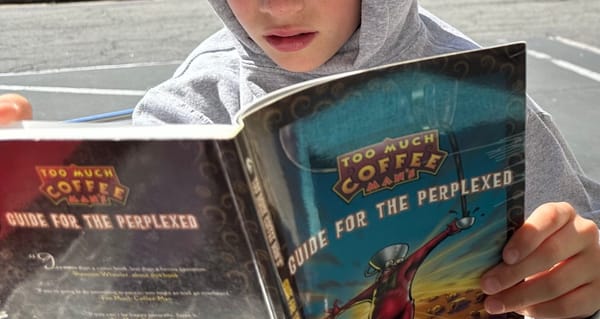ode to material things
my meaningful, purposeless life
I agreed to write a short article this fall on the topic of purpose, and I’m going to write about how, despite all the talk about needing to “find your purpose,” we don’t need purpose to find meaning in our lives. Which is all very abstract, and it’s the kind of thing that can get very self-helpy very fast, so I’m going to write here to try to figure out what I want to say. (This seems to be the value of substack for me: writing here comes with the knowledge that someone could read what I write, which makes me try a little harder, even though I know no one else does read it.)
I’m typing this on a new keyboard. It’s a mechanical keyboard, which is a whole thing, and people who are into mechanical keyboards are way into mechanical keyboards. But I got a nice mechanical keyboard because—and what comes after this “because” is 95% a rationalization, I realize—first, my iPad keyboard has a wonky “w” key that sometimes doesn’t register, and I need to get it fixed; but I just had Apple fix the “1” that fell off, and I haven’t had time to go back to the store for another fix.
But the real story is a combination of that one and a story that started to emerge as I realized that I had an excuse to buy a new keyboard. That story goes something like this. A keyboard is something I spend a lot of time using, and anything that makes that time feel a little better is that much more worthwhile. More importantly—and this is the 5% that probably isn’t a rationalization, or is at least a damn good rationalization—anything that makes me more excited to sit down and write is good, since I often enjoy writing, or at least some parts of writing, but it’s hard to get excited about sitting down to the blank screen of a new project. So having a keyboard that I’m excited to use helps get past that initial reluctance because I’m at least excited to sit and type, even if I don’t know exactly what I’ll type. Sometimes it’s enough to start putting words down, even bad ones.
A reasonably prolific friend told me that his writing strategy was to open the blank document, then go make a cup of coffee, so that when he got back to the computer, he would have had time—to overinterpret what he said—to process his reluctant feelings so that he could sip the coffee until the words started coming. I have a harder time processing my reluctant feelings, I suspect, so I adapted his technique by telling myself, once I sat down, that my commitment was to sit there, not necessarily to write, as long as I didn’t do anything else. So staring at the blank screen was fine, sometimes even relaxing, and if the words came, they came.
But that strategy doesn’t make me excited to get in front of the screen. For that I need a schedule, which I’ve had at times and will have again now that the semester is over. Or, for another strategy—see where this is going now?—I need a new keyboard that motivates me to sit down to type even when I have other things to do. A schedule is cheaper, but the new keyboard is cooler.
Here’s another new thing I got a while back. (This is going somewhere, I promise.) I ordered a new umbrella, a nice one. It’s not fancy—what makes an umbrella fancy?—but it’s definitely nicer than the umbrellas that I’ve sacrificed over the years.1 Before I bought this nice umbrella, I spent months deciding which one to buy and which color, and, when I got it and opened it, I had the amused thought, “This doesn’t make me happy.” I didn’t really expect the new umbrella to make me happy, of course, but that amount of effort into picking the right umbrella seemed like it should have paid off with more than just an umbrella coming in the mail.
But here’s the materialist thing: it’s been many months now that I’ve had that umbrella, and it does in fact make me happy. Every time I get to use it, I’m happy that I get to use it. It’s a nice umbrella in exactly the ways that I expected. It’s not nice enough to repair a miserable life—it’s still only an umbrella—but it’s a little spark of happiness on days I get to use it.
The keyboard is too new to be sure, but, given my ongoing reaction to the umbrella, and to a few other things, like a couple of nice pens that I use to take notes in their corresponding nice notebooks, I predict the keyboard will be the same. It’s a little bit of happiness when doing something that is otherwise merely fine; or, when it comes to facing down a blank screen, something that is otherwise a little bit worse than fine.
The umbrella, and the pens, and probably the keyboard, and many, many other things in my life are part of a comfortable pattern. I’m indifferent to most of my coffee mugs, but I’m that little bit happier when I see one of a couple of them in the front of the cabinet. I really like this one hard-sided cardboard portfolio folder that I use to carry papers to and from class so they won’t get worn. It’s not all stuff that’s especially fancy or expensive; this folder was expensive for a folder, but that’s like “famous for a philosopher,” i.e., not expensive.
I’m not curating my life into some Marie-Kondo-style house where I have two coffee mugs, two pens, an umbrella, and a keyboard: it’s convenient to have lots of other stuff that doesn’t make me all that happy. Plus, some of the stuff that doesn’t make me happy plays a role in other parts of my life that do make me happy. The keyboard is nice, but I don’t want to type all the time, and the basketball I use when playing with my son doesn’t make me happy, but playing with him does. If I really pared down, opting for a house just large enough to store the stuff that I need when I do the things that make me the happiest, then I’m back to expecting the umbrella and keyboard to make me happy: I love reading and writing in a cafe as nice parts of my life, but that doesn’t mean that I would love reading and writing in cafes as my entire life. There’s more to life than the peak elements, and not every element needs to be raised to a peak for life to be good.
This finally gets me to my point (word count >1100). There are lots of ways to understand the meaning of a life. I’ve only been thinking about this seriously for a couple of years, so I don’t have much to say about meaning yet—maybe I never will. But I have two thoughts.
The first is what I’ve just said: meaning is not the high points in life. An umbrella doesn’t give my life meaning. That’s why it didn’t make me happy, not even a little, when I first opened it. The problem isn’t that it’s a physical thing: physical things can make us happy and even make life more meaningful—think of something with deep sentimental value. The problem is that opening an umbrella is encountering one thing, just once, on its own, without a connection to much else in my life. I wasn’t opening up a package with my great-grandfather’s umbrella cane that he used after the war or something. I’m still not entirely sure how to characterize meaning, but, mostly, it’s more than a single thing, no matter how great that thing is.
But the umbrella—as strange as this sounds to say it—can become part of a meaningful life in the way that things with sentimental value do. That’s the second thing I can say. Meaning comes from seeing some kind of pattern in one’s life, seeing that one’s life comprises more than the individual actions. Using great-grandpa’s umbrella or wearing great-grandma’s engagement ring connects to all kinds of other things in one’s life, making it more than a nice object, however nice the umbrella and ring are.
Now, one way to see a pattern in one’s life is to see that one’s life has a purpose, that the actions and events are all heading somewhere, in the service of something beyond oneself. But that’s conflating two things. One sense of “finding meaning” is doing something that is larger than one’s immediate actions. A middle-aged Parisian woman once waxed on about the croissant and espresso she had every morning while a university student, not because any one coffee or pastry was amazing or was changing the world, but because it was comfortable, memorable pattern. She can tell a story, decades later, about it.
Some of those stories, though, are not only about connecting one’s actions to a pattern, but about finding a pattern that itself has some goals that are larger than oneself. If she had instead been talking about the time she spent working in a homeless shelter passing out espresso and croissants—I can only assume Parisian homeless shelters provide espresso and croissants—then her actions not only would have been part of a pattern but would also have been contributing to a purpose that she could identify and defend as valuable, not merely enjoyable.
That’s my point (yep: nearly 1600 words now). A meaningful life can be built around reducing poverty or bringing christianity to the heathens—or building bridges and destroying neighborhoods, which I’ll write more about sometime—but it can also be built around purposeless patterns. Sometimes those purposeless patterns are roles like being an ethics teacher or a woodworker who uses techniques from the 18th century, and sometimes they’re patterns that don’t even fit into clear roles, like days spent reading books and watching movies and typing long posts onto a website that no one will read in order to work out one’s own thoughts about something. Maybe I call that being an academic, and maybe it’s just a patterned way of wasting time. Meaning is surely more than finding patterns in life, but patterned ways of wasting time can be meaningful, if the patterns are recognizable and intentional enough. Going to college, for lots of people, is probably more like a pattern of wasting time than a purposeful act, and might still be meaningful. If the pattern is intentional and understood as something bigger than one’s immediate actions, maybe even bigger than oneself, then it could be meaningful; purposeless but meaningful.
A friend in London once pointed out that, while losing umbrellas was common there, free umbrellas were also readily available. You could also go into any nice pub or restaurant and say that you recently left your “small black umbrella” there and then pick one out of the lost and found. I don’t know if he tried that strategy or only speculated that it would be certain to work. ↩


